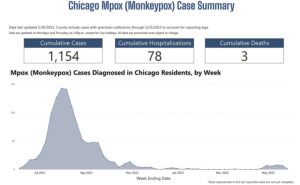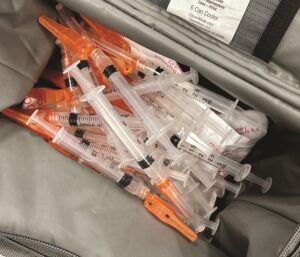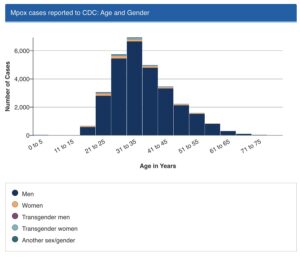PROVINCETOWN — The virus that roared through the gay community on both sides of the Atlantic last summer subsided almost as quickly as it arrived. Mpox — formerly known as monkeypox — landed at a massive gay gathering in the Canary Islands last spring and from there spread to Europe, Canada, the U.S., and across Latin America before starting to fizzle out.

There were only 330 new cases nationwide last December, and just 41 cases in April. At the peak of the outbreak last August, there had been a total of 21,993 cases nationwide — and half of them had been discovered that month.
Over the entire outbreak, women accounted for less than 3 percent of all cases. Previous outbreaks of Mpox had featured more casual transmission of the virus, including within households and to people doing laundry — but last year’s outbreak turned out to be almost entirely transmitted through much more intimate physical contact.
Even so, that Mpox faded so quickly was unexpected. Massachusetts had reported about 350 cases between last Memorial Day and Labor Day. The data that were released did not break down the numbers by county or town, but several sources indicated to the Independent that a significant fraction of those cases were in people who had either lived on or visited Cape Cod.
As a result, Outer Cape Health Services in Provincetown was one of the state’s first major distribution sites for Jynneos, a smallpox vaccine that also protects against Mpox. By early August, OCHS staff had vaccinated more than 2,100 people against Mpox.

Though vaccination does not completely prevent the disease, AIDS Support Group CEO Dan Gates said that the vaccination campaign — and the community’s willingness to talk about the disease — helped to stop it.
“I think people took the potential risks very seriously and changed their behaviors a bit to protect themselves,” Gates said. “There was robust vaccine access here. And part of what spread the word was that people who experienced it shared about it, online or in their social circles, and that really helped us.
“I understand why people were concerned about how to message it,” Gates added. “The first few people I spoke to about it had a really visceral response, remembering what it was like in the ’80s, and the ‘gay disease’ label of HIV. We went into this trying to be really cautious about that.
“There was a real communal response though,” Gates said. “People were talking about it, posting pictures of their experience, and I saw countless examples that were really free of stigma and sex-positive, talking about how to protect one another.”
The AIDS Support Group ran free Jynneos vaccine clinics in October, November, December, and January, Gates said. There will be several free vaccine events this summer as well, including during Bear Week, around the Fourth of July, and on Friday, June 2 and Saturday, June 3 — Pride weekend.

Those vaccination events will run from 9 a.m. to 4 p.m. at the AIDS Support Group’s drop-in center at 301 Commercial St.
Two weeks ago, the Illinois Dept. of Public Health announced that there were 24 cases in an Mpox cluster near Chicago — so the disease has not gone away. A majority of people in that cluster were vaccinated last year.
The cluster was discovered more than a month ago and appears to be fading out already, however. The case curve, posted online by the Chicago Dept. of Public Health, has been flat and then downward in recent weeks.
Massachusetts has not yet posted data for May, but in April there were no new cases of Mpox, and in March there was only one.
“If someone has had both vaccines, their risk is considered to be significantly lower than someone who has not,” Gates said. “Much as has been the case with Covid, if they had a breakthrough infection, it would be a less severe case.”
No additional doses of vaccine are recommended for people who have already had two shots.
“If you’re going to be having fun this summer, our message is to get vaccinated twice and have your friends do the same,” Gates said.



